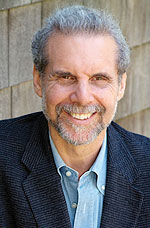Get our Newsletter
-
- Reviews
- Narrators
-
Features
- Audiobook ClubStart a conversation with your book club
- Best Audiobooks2023 Best Audiobooks
- ArticlesDiscover the diverse voices of audiobooks
- NarratorsSpotlight on popular narrators
- AuthorsAuthors talking about their audiobooks
- Upcoming TitlesFind upcoming audiobook release announcements
- Kids and TeensListening selections for kids & teens with age levels
- Audie Awards 2024 Audie Awards
- Subscribe
- About
- Articles
Recent audiobooks
Talking with Daniel Goleman

2009 Best Voice in AUTHOR-READERS: Ecological Intelligence
Getting into journalism was a “complete accident,” says the author of SOCIAL INTELLIGENCE, an exhaustive and important study on the neuroscience of human interactions, released last year. After finishing his Ph.D. at Harvard in the 1970s, Daniel Goleman didn’t find a psychology teaching job he really wanted, so he abandoned academia when offered an editor position at Psychology Today. Writing advice from his managing editor led to 12 years as a science writer for The New York Times and seven books, most of which are available on audio. “My managing editor would go over every line and every word I’d written and show me how to get out of the passive voice and into the active voice, how to use a story to make a point. You know that guy was a gift because I had to unlearn all the bad writing habits I had as an academic.”
Asked for his thoughts on personal development, Goleman makes a clarification. “I’m a theorist, so what I do, from my point of view, is integrate the newest information so that people who design helpful programs will have good science underlying what they do. I don’t see my books as self-help because I don’t have recipes for what to do, but I do see them as giving helpful information.”
Goleman is excited about the power of audio. “Our brains are designed to continually draw a huge amount of emotional information from listening to someone talk, and that’s what keeps us interested. It’s not the content of the words. That’s part of it, but what glues us to the voice are the emotions that are imparted along with the words.” Goleman adds that when the voice of a narrator is genuine or authentic, it is picked up “instantaneously and automatically” by circuitry in the brain that is designed to connect with other people’s feelings. “It creates an immediate bond between the listener and the person speaking.”
How does an audio program inspire actual change? “It has to have meaning--to be connected with someone’s sense of purpose in life or something that is troubling them about their life.” This happens best, Goleman adds, when you’re in the presence of a secure and genuine person--”a presence that you feel comforted, relaxed, and secure with, and that relaxation allows you to learn better and to practice better. In the classroom it allows kids to take in information better, but I think it works when you’re listening to a tape also--it’s the same dynamic.”
With so many diversions like iPods turning people away from such security instead of toward it, we asked the grandfather of four children if he thinks this trend will continue. “I think it’s going to continue but that there will be a reaction to it--there will come a premium on personal presence and touch. I think being able to hang out with people will be seen as even more valued--not taken for granted. There’s something nourishing about being with people you love, and no digital product is ever going to replace that.”--Thomas Walken
FEB/MAR 07 © AudioFile 2007, Portland, Maine
Photo © Frank Ward
The latest audiobook reviews, right in your inbox.
Get our FREE Newsletter and discover a world of audiobooks.




